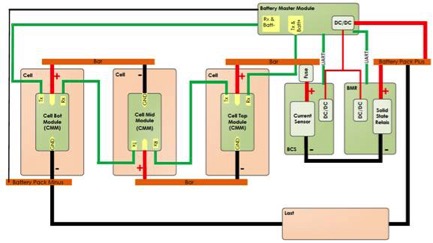RKB MODULAR PROTECTION
The BMS is modular and can be easily adapted to suit customer requirements. It has been developed for high-capacity batteries from 40Ah and contains all the safety aspects required by a protection circuit for lithium technologies.
The thresholds are adjustable and, therefore, not tied to a particular lithium technology. A Coulomb counter provides a very accurate level display.
The BMS can communicate with external components, such as the control of the device, exchange data and transmit detailed information about the state of the battery.
Even without a data interface, there are ways to maintain and control the battery by means of inputs and outputs.
The BMS consists of 4 components:
BMM (Battery Master Module):
Control centre of the entire BMS
- 6 digital and 2 PWM inputs.
- 8 digital and 2 PMW outputs.
- Communication standards: RS232 via USB, CAN2.0, CANopen (CIA 418/419 + specific objects).
- Optional: Bluetooth, GSM / GPRS, WiFi.
CMM (Cell Monitoring Module):
Single cell module, reports voltage and temperature; performs balances, control by the BMM.
- Direct mountable to GBS cells 40Ah-100Ah.
- Installation on CALB, WINSON, SINOPOLY or identical cells is also possible.
BMR (Battery Main Relay):
Disconnector for the whole pack, controlled by the BMM..
BCS (Battery Current Sensor):
Current sensor, calibratable, current monitoring takes over the BMM.

The RKB-BMS is flexibly adaptable with regard to battery technology, voltage, capacity and current-carrying capacity, thanks to an ingenious modular system.
It can communicate with other peripherals via USB or RS232, CAN or CANopen.
A configurable long-term logbook is implemented for devices in the test phase.
This logbook can be used to record values on an SD card at certain time intervals and evaluated as required.
On request, the BM-system are also equipped with an additional wireless programming or remote maintenance interface via Bluetooth or GSM.
By means of many configurable inputs and outputs, even non-communicating peripherals can receive various information or influence the behaviour of the BMS.
This might include information about the current level, whether the power should be reduced or whether a fault is present.


